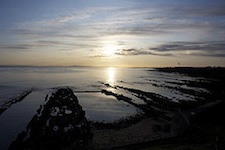LUKE KELLY

Luke Kelly
Biography
Luke Kelly
From Wikipedia, the free encyclopedia.
Luke Kelly, (17 November 1940 - 30 January 1984) was an Irish singer and folk musician from Dublin, Ireland.
Kelly was one of the best-known figures of the Irish folk music movement of the 1960s and 1970s. A Dubliner from the north inner city, he attended O'Connell's Schools before emigrating to Britain in 1958. There he first became involved in the growing international folk music scene in which Ewan MacColl was a central figure, as well as joining the Communist Party of Great Britain.
In 1962 Luke Kelly returned to Dublin and quickly became a central figure in the city's burgeoning folk music community, playing in sessions in O'Donoghue's pub on Baggot Row with the likes of Ronnie Drew, Barney McKenna and The Furies. Not long after, he ended up forming a folk group with Drew, McKenna, Ciaran Bourke and John Sheahan, called The Dubliners (although Sheahan was in fact from County Galway). In 1965, Kelly married the actress Deirdre O'Connell, one of the founders of the Focus Theatre.
In the mid-1960s, Luke moved to England for a while. On returning, he rejoined the Dubliners. His interpretations of Raglan Road (a poem by Patrick Kavanagh) and Scorn Not His Simplicity were significant musical achievements and became points of reference in Irish folk music. Luke remained a politically engaged musician, and many of the songs he recorded dealt with social issues, the arms race and war, and workers' rights (The Springhill Disaster, Second World Song, When Margaret was Eleven, The Button Pusher and Alabama 1958 all being good examples of his concerns). One of the Dubliners' seminal albums was titled Revolution. In the socially and politically conservative atmosphere of the Republic of Ireland at the time, this was notable.
Luke Kelly was diagnosed with a brain tumour in 1980, and died in 1984. He remains a Dublin icon and his music is widely regarded as one of the city's cultural treasures.
In November 2004, the Dublin city council voted unanimously to erect a bronze statue of Luke Kelly. As of this writing, the location for the statue had not yet been decided upon.
From Wikipedia, the free encyclopedia.
Luke Kelly, (17 November 1940 - 30 January 1984) was an Irish singer and folk musician from Dublin, Ireland.
Kelly was one of the best-known figures of the Irish folk music movement of the 1960s and 1970s. A Dubliner from the north inner city, he attended O'Connell's Schools before emigrating to Britain in 1958. There he first became involved in the growing international folk music scene in which Ewan MacColl was a central figure, as well as joining the Communist Party of Great Britain.
In 1962 Luke Kelly returned to Dublin and quickly became a central figure in the city's burgeoning folk music community, playing in sessions in O'Donoghue's pub on Baggot Row with the likes of Ronnie Drew, Barney McKenna and The Furies. Not long after, he ended up forming a folk group with Drew, McKenna, Ciaran Bourke and John Sheahan, called The Dubliners (although Sheahan was in fact from County Galway). In 1965, Kelly married the actress Deirdre O'Connell, one of the founders of the Focus Theatre.
In the mid-1960s, Luke moved to England for a while. On returning, he rejoined the Dubliners. His interpretations of Raglan Road (a poem by Patrick Kavanagh) and Scorn Not His Simplicity were significant musical achievements and became points of reference in Irish folk music. Luke remained a politically engaged musician, and many of the songs he recorded dealt with social issues, the arms race and war, and workers' rights (The Springhill Disaster, Second World Song, When Margaret was Eleven, The Button Pusher and Alabama 1958 all being good examples of his concerns). One of the Dubliners' seminal albums was titled Revolution. In the socially and politically conservative atmosphere of the Republic of Ireland at the time, this was notable.
Luke Kelly was diagnosed with a brain tumour in 1980, and died in 1984. He remains a Dublin icon and his music is widely regarded as one of the city's cultural treasures.
In November 2004, the Dublin city council voted unanimously to erect a bronze statue of Luke Kelly. As of this writing, the location for the statue had not yet been decided upon.
Releases
ACCOUNT
SHOPPING CART
You have no items in your order.
MAILING LIST
TOP SELLERS
- Órach
The Tannahill Weavers
CD: £12.15 - In Praise of Home
Rura
CD: £11.80 - Beyond
Talisk
CD: £10.29 - St. Kilda Wedding
Ossian
Download: £7.00 - Osgarra
Beinn Lee
CD: £11.80 - 100 Scottish Greats
Various Artists
4xCD: £9.40 - Sleeper
Kan
CD: £12.60 - Songs Of The Jacobites -Vol 2
Kenneth McKellar - Evo
Skerryvore
CD: £10.00 - Cavalier
Eddi Reader
CD: £10.00
YOUTUBE
We have a YouTube channel where you can watch some of the celtic music related videos we've found.www.youtube.com/allcelticmusic
Threads of Sound
The downloads on this site are provided by Threads of Sound. They also distribute music to iTunes, eMusic, Spotify and many others. If you want to sell your music on all celtic then you register it via Threads of Sound.www.threadsofsound.net

MASTHEAD
Our current header image was taken by Nick Bramhall and you can find the original here.Privacy Policy | Terms & Conditions | Contact Us
© Threads of Sound Music Services Limited. T/A All Celtic Music - Registered in Scotland no. 475134
